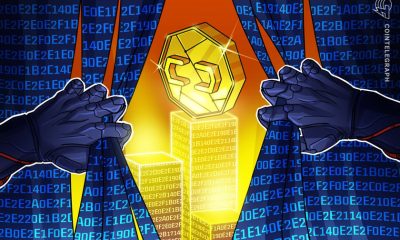Blockchain
Fake Tokens Continue to Plague Uniswap

The growing popularity of Uniswap is continuing to attract scammers, with fraudulent coins impersonating token sales for top crypto projects.
Fake coins continue to plague decentralized exchange Uniswap, with prominent crypto projects associated with upcoming token sales reporting impersonators trading on the platform.
On August 19, upcoming decentralized finance (DeFi) lending protocol Teller Finance tweeted that a fake Teller token and Uniswap pool had been created.
“Teller Labs has not made any official announcements on any potential, planned, or upcoming token launches.”
The highly anticipated NEAR Protocol token sale also attracted impersonation scams in the lead-up to its commencement last week, tweeting that any NEAR tokens not officially sanctioned:
“The only place for official word of NEAR tokens is near.org/tokens. Any NEAR currently for sale at locations not mentioned there are not officially sanctioned by the NEAR Foundation and participating puts you at severe risk.”
Cointelegraph has identified two tokens impersonating NEAR that have traded on Uniswap over recent weeks.
Acala Network has also encountered scammers ahead of its tokensale, with the project’s website currently hosting a banner stating that “there is no official public sale of Acala tokens” and asking community members to report impersonation scams to the team. Cointelegraph has not identified any fraudulent Acala tokens currently trading on Uniswap however.
Scam tokens target Uniswap traders
Unlike centralized platforms, Uniswap does not maintain any rules or criteria for listing, meaning that anybody can list an ERC-20 token on the exchange.
Crypto market data aggregator CoinMarketCap currently lists Uniswap as hosting more than 400 active pairings, in addition to more than 300 markets that the platform has not yet verified.
Ethereum founder Vitalik Buterin this week shared a Cointelegraph article about the prevalence of scam tokens on Uniswap and advocated the establishment of “decentralized reputation systems” to mitigate the risk:
The filtering and quality control functions that are done by centralized services are essential, even though centralized actors having a chokehold on those functions is very dangerous. We need more work on decentralized reputation systems to try to get the best of both worlds.
— vitalik.eth (@VitalikButerin) August 15, 2020
Dispute resolution protocol Kleros believes its curated registry of tokens can solve the problem of scam tokens — with its registry comprising tokens that are not associated with malicious addresses, and offering badges that indicate coins have undergone user-vetting.
Kleros has also launched a Uniswap front-end that prevents users from trading tokens that the project has not verified.

















